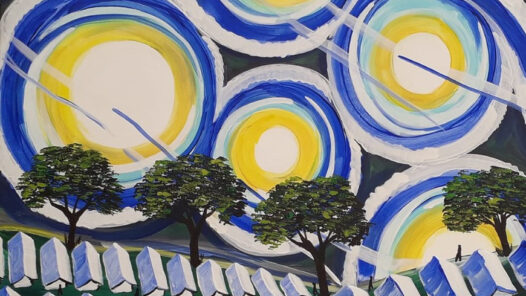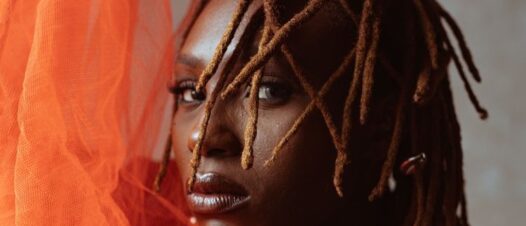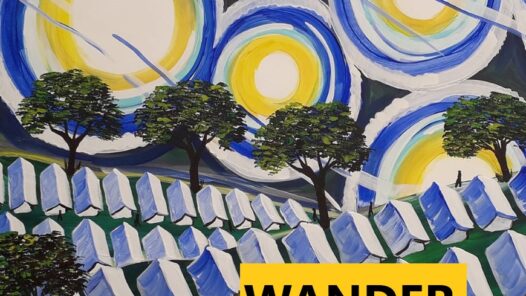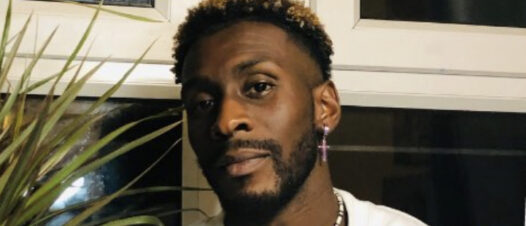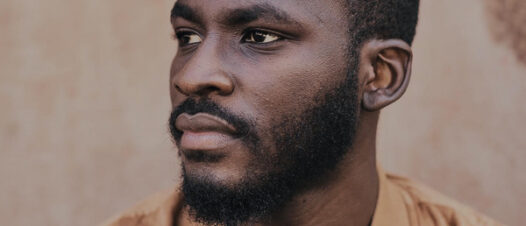Poet and playwright, Nandi Jola, lived in South Africa under the apartheid regime until she was 21, when she moved to Northern Ireland.
She’s a Rachel Baptiste 2022 Programme recipient at Smock Alley Theatre. A creative writing facilitator for Ulster University ‘Books Beyond Boundaries’, and a commissioned poet for Poetry Jukebox and Impermanence Way Archive Project 2022. Her play “The Journey”, opened the International Literature Festival in Dublin in 2020, and she represented Northern Ireland at the Transpoesie Poetry Festival in 2021.
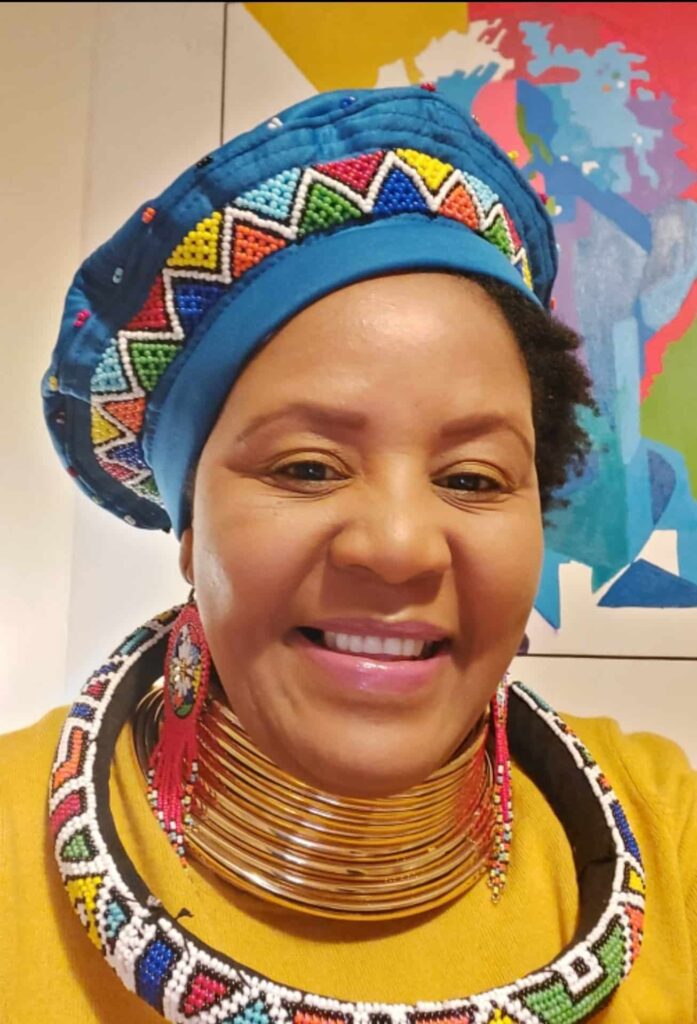
We talk about Direct Provision, South Africa, and the threat of deportation that hangs over so many people. Her debut poetry collection – Home is Neither Here Nor There – is published by Doire Press and is a beautiful, personal account of growing up under apartheid in South Africa, and her struggle as an immigrant in Belfast.
And she reads two poems from this collection – ‘I’m Not A Racist, But’ and ‘Ink’ and her specially commissioned piece for WANDER.
This piece opens with a line from Simone Leigh and you can read Leigh’s full essay here.
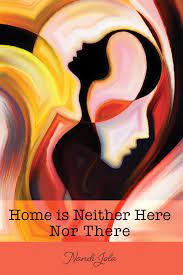
Thanks again to the Arts Council of Ireland for funding this new commission – and for their support for this podcast series.

TRANSCRIPT:
Bairbre Flood: Hi, and welcome. My guest today, poet and playwright Nandi Jola, lived in South Africa under the apartheid regime until she was 21, when she moved to Northern Ireland. She’s a Rachel Baptiste 2022 program recipient at Smock Alley Theater, a creative writing facilitator for Ulster University Books Beyond Boundaries and a commission poet for Poetry Jukebox and Impermanence Way Archive Project 2022. Her play The Journey opened the International Literature Festival in Dublin in 2020, and she represented Northern Ireland at the Transpoesi Poetry Festival in 2021. Her debut poetry collection Home Is Neither Here Nor There, was published by Doire Press last year, and she’s also studying for her MA in Poetry at Queens University Belfast, which she tells us about after reading this poem.
This is Nand Jola.
Nandi Jola: I’m Not A Racist, But
I know you are simply asking why so many people want to come here. To take your jobs, your houses, when you have given so much to them. A penny every Sunday in church at the corner. Shop in the trucker box with the black baby. Them a penny gold for you in return. Keep digging diamonds.
I keep a penny for you. Sweet sugar. A penny. Coffee to another penny. So you are not a racist. I hear you.
[MUSIC]My manuscript as the publisher puts it, is just the heart of what I was going through, which was the immigration process, you know, having come from South Africa to come to Ireland on a work permit and then having to actually then apply for citizenship and things like that. So it was all of those experiences.
So I suppose for me, the MA was good. For me going forward, but I needed the actual manuscript and my first book to be the raw emotions of what it was like for me to be a migrant. So in a way, it’s been great. The MA is gonna help me write structurally and actually save me time editing, do my own edits and things like that.
But the actual book itself was kind of a way of letting people see the vulnerable side of me, the side of me that was impacted by this great change in my life, which was migration.
Bairbre Flood: Yeah, I mean, I really like that one – ‘Ink’. I dunno if you, if you’d read that for me? About the day you got the, the letter – would you read that one?
Nandi Jola: Absolutely.
Ink.
A letter came today, 10 years late, but it arrived majestic and reverent. It addressed me by my first name with the titles, miss and dear. The letter came today, 10 years late, but it arrived. I am now a citizen. I will breathe the same air as you walk the streets of Belfast without fear Rome Island like a bird.
I am no longer a case number, a statistic. I’m not on the next Chatter plane. No. Am I going from detention to deportation? I am. The letter came.
[music]I actually got a message last night from a friend of mine who bought the book, and she’s a refugee. She got her status yesterday and she was in tears because she said that it’s so much resonated with her now that she had the letter in front of her, that citizen. Will come at some point she believed, but when she got the letter, that’s when she felt like she could breathe.
Bairbre Flood: And this might be a very loaded question and you don’t have to answer it if you don’t want to, because I don’t want to minimize the effect of apartheid and that system. But do you see any links between apartheid as it was and the Direct Provision system – even in terms of how people are kept separate and you know, obviously they’re different systems, but, but do you see any kind of links between them or what’s your thoughts on that?
Nandi Jola: Yeah, I mean, as you know, I’m in the different system altogether being in the UK, so I’ve never been directly impacted by Direct Provision, but I have friends who have, and to me it’s not to minimize their experience or the apartheid experience.
And in saying that, I can’t compare the two. The only thing that I can say impact is on mental. And when a person comes out of direct provision, whether it be five, 10 years or more in, in most cases that I know is the ability to erase memory. What direct provision does. It doesn’t just strip you of your own dignity as a human being in the sense that you can’t go as you please and come as you please.
But it is the ability to strip you completely of memory. And as a writer, as a poet, I rely so much on memory. When a person comes out of that experience, the trauma that has been, you know, put on them, makes it very difficult, especially if a person has come here with a lot of trauma that they’ve carried, you know, from war torn country or trying to even survive what they’ve been through.
Bairbre Flood: As you’ve heard in previous episodes, thanks to the Arts Council, I was able to commission new pieces for this season, inspired by the theme of Wonder. It was completely up to the artist how they interpreted that. And Nandi wrote the following, which blends essay history and poetry into a beautiful, philosophical, personal and political.
It’s quite long, so just sit back and relax and enjoy listening to this…
Nandi Jola: Sovereignty.
‘To be sovereign is not to be subject to another’s authority, another’s desires or another’s gaze, but rather to be author of our own history. ‘ – Simone Leigh
History is something that, for me, it’s very important, especially coming from a place that has been rooted in division.
For me, history is what I have in memory, and therefore that memory is what I rely on to relay my side of the story. We have an African proverb that says, until the lion learns how to write, the story will always glorify the hunter. And that’s how I feel when they say that black people have no. Therefore, it’s my duty then as a black child to document my own history and therefore to be my own storyteller.
I suppose to open, I can open with this poem Changing Hands. For me, it tells the time and how time changes and how it continues to tick and change the l. Of Africa, South Africa, where I come from, changing hands. The tourist square on the main street is filled with pigeons dotted across the mosaic tiles brought in by the Portuguese migrants who arrived after the Germans.
The square is a symposium overlooking Elizabeth Street emitting of cultures from Mogadishu to Harere, scrambling for the gold dust left behind during the Anglo Irish war. It’s not hard to find a treasure here in these English street names and buildings erected in the African skies. Motherwell is here, so is Belfast – in Africa – in this friendly city called Port Elizabeth.
Suppose to start with the name, Port Elizabeth. The city itself has seen a sea of change. In my essay in Permanence Way, I refer to how the city has changed names four times. It was first known as Port Elizabeth as we have the statue. Erected just outside the main library, and then the city was known as Iba.
That’s what we called it when we were throwing avocados, pretending that there were grenades on the streets trying to frighten the enemy, and the enemy being the white man. It then saw a change, a rainbow change in what dada Mandela referred to as the Rainbow nation, and therefore it was named the Nelson Mandela Bay.
And now after 20 years, presence has come in the form of a river. I have been absent from this city for 20 years, and therefore when I returned and learn that it is now known as Gqeberha.
Gqeberha is the name of the river that flows through the city and connects to Tus River. Tus is synonymous with Sarah Batman story.
A young woman who was trafficked to England promised of course a career of dancing. But what she encountered was not just the cold weather in England, she also encountered cold people, cruel people that exploited her as a sex slave. And she worked as what we know today as the hot and to of Venus. And in those days, she worked in freak shows, exhibiting her buttocks, exhibiting her body for love.
For amusement and for some people they thought that she was not even fully human. And therefore, for me to come back to this city, knowing what I’ve lent in Ireland through direct provision and through other things, that immigration is intertwined twine that we use to connect our. As the Irish people have immigrated themselves to far parts of America, Africa, in such of what we always search for food safety shelter.
Like a needle on a thread, weaving in and out of English and Swahili. A nun taps a woman on the shoulder.
Hello, how are you? And then they speak for the rest of the journey through their habit and hijab. The boy’s limb stretches towards the bell between prams stairs and moist breath of an early bus. She struts below under pale faces to the halt of the bus. This is what Irish means. She thinks to herself, strangers speaking to you in Swahili.
When I think what Ireland is to me and how as an African I stand in the landscape coming back to Africa on this project of entrepreneurs looking at the climate and what colonisation and immigration have done to this planet, I suppose I have to trace back and look at things that are. And look at things that are different and ask myself, are there any things that we as a human species responsible for?
And if so, how can we repair the damage? I suppose the first landmark for me would be the city hall in Belfast, which is identical to the city hall in Durban, South Africa. Because it was built by the same architecture, and therefore I asked myself in a cold Belfast and in a hot South Africa, what was the intention of these two buildings looking exactly the same in diameter and in appearance?
And therefore, I have to reckon that it was. Thinking that Africa, especially South Africa, will be a mini Europe. And in some ways this has been successful in Cape Town. We look at so many buildings that have been erected by Rhodes on his quest to making.
What he called civilized through education and through religion and of course religion is the one thing that divides people. Where I live in Belfast, in Northern Ireland, it’s not something that you openly say that you are. Even though you get probed, you get probed. You get probed into admitting or into saying what you are, what you really.
Are you a black Catholic? A black Protestant? And if you’re a Muslim, are you a black Catholic Muslim or a black Protestant Muslim? And therefore, I suppose this journey for me comes clockwise. It begins with the book that I found when I was driving from Cape Town.
Writing was even a more of a privilege. There’s no way that a black child would’ve thrived to become a writer, not with the ban to education that we were equipped.
And therefore when I laid my hands and eyes on this beautiful book called The Garden Root by Joseph Bowman was written in 1964, and to say that in 1964, South Africa was a different place altogether. I love the introduction that he opens our eyes with when we look at it and he says, compared with elderly cities such as London, and Paris keep telling me seem young. And remember, this is 1964, yet she’s no adolescent. England had lost his head only three years earlier, and the pilgrim father fathers were struggling to establish themselves on the inhospitable. host of America when Jan Van Riebeeck stepped ashore at Cape Town. How I wish Jan Van Riebeeck never stepped here.
How I wish that I would have the knowledge of what Africa or Africans were like before the white men stepped on the shows. Because for me it’s like digging a bottomless tip and pit, trying to find the. Maybe the answers are in the British Museum that holds 73,000 artifacts from Africa. Maybe they’re in Belgium, which holds 180,000 artifacts from Africa, because here in Africa, what I’m looking at through my window is poverty in these brutalist buildings that were.
To last in this landscape that are forever shifting, like elephants returning home. The ground is always shifting here in Africa. The sun is always shining here in Africa and therefore an ugly brutalist building would do no harm to this blue African skies and therefore, For me, the quest to find answers begins in my DNA.
It begins where I wanted to live. It begins where I have left. And therefore, to go back to Simone about sovereignty and to say that I am in no one’s authority, I’m in no one’s desire or gaze. Will be a mere fantasy for, I know too well what it’s like to be black amongst a population that is predominantly white in Ireland.
And I also know what authority means when you have to deal with the home office that is making a decision for you to have citizenship or not. In that gaze that is forever asking questions when I going back home, as if this is not home, as if home is a place of bricks and mortar, as if home is not a feeling, as says in her poem, why would you go back home when home is like a mouth of a shark?
But for me, fortunately, our apartheid ended.
And the journey ahead for me is one of reconciling with all the things that were never written in history by a black man or woman.
Bairbre Flood: That was Nandi Jola reading her piece, inspired by the theme of Wander. A huge thanks to Nandi for creating it and for talking to me. The other poems she read at the start of the program are, I’m Not A Racist, But, and Ink both in her new poetry book Home Is Neither Here Nor There, published by Doire Press.
Thanks again to the Arts Council of Ireland for funding this new commission and for this support for this podcast series. Thank you so much for listening. See you again next.

